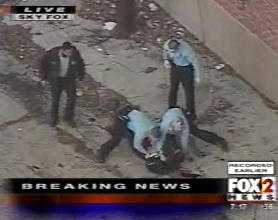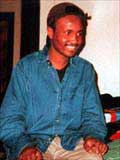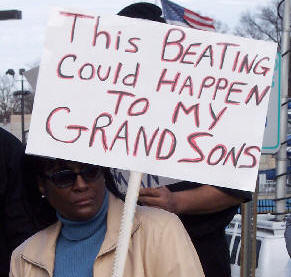(An Open Letter To The Peace and Justice Movement)
Michael T. McPhearson
February, 2006
 In these critical times when the people of the world are trying to bridge deep divides, I write this letter to my sisters and brothers of all persuasions in the Peace/Antiwar and Justice Movements. Some of you know me. Most of you do not, so I will attempt to give a quick glimpse into my background and why I write you. I am an Army combat veteran of Desert Shield/Desert Storm (the First Gulf War) who now understands that war if ever is seldom the answer. I am a worried father of a son currently serving in the immoral and illegal war in Iraq. I am a U.S. citizen concerned about the direction of our nation and a world citizen who knows that our future as humankind is inextricably bound together. However, today I write to you as a Black man in America who believes that our movements’ greatest weakness is our reluctance and near psychopathic avoidance as progressive and liberals to face the old and tired challenge of the idea and concept of race.
In these critical times when the people of the world are trying to bridge deep divides, I write this letter to my sisters and brothers of all persuasions in the Peace/Antiwar and Justice Movements. Some of you know me. Most of you do not, so I will attempt to give a quick glimpse into my background and why I write you. I am an Army combat veteran of Desert Shield/Desert Storm (the First Gulf War) who now understands that war if ever is seldom the answer. I am a worried father of a son currently serving in the immoral and illegal war in Iraq. I am a U.S. citizen concerned about the direction of our nation and a world citizen who knows that our future as humankind is inextricably bound together. However, today I write to you as a Black man in America who believes that our movements’ greatest weakness is our reluctance and near psychopathic avoidance as progressive and liberals to face the old and tired challenge of the idea and concept of race.
As the Executive Director of Veterans For Peace I have chosen to resist war and follow the path of a peacemaker. While attending meetings and speaking engagements over the past four years, I am asked many times if I had any thoughts on why more non-white people specifically African Americans do not involve themselves more openly in the peace movement? It is clear as a group African Americans are against the war in Iraq. According to a November 4, 2005 USA Today article, a Pew Research poll of the same year found Blacks nearly twice as likely as Whites to have strong reservations about the war. Michael Dimock, a Pew pollster, said “it would be hard to find a group where the war in Iraq is less popular.” Yet few Black people are directly involved in the movement to stop the war. Why are our meetings so White? The answer to this question is complex and well beyond my abilities to fully explain. However, there are a few experiences I would like to share with you.
In 1992, I left the Army and about three years later moved to Saint Louis. Motivated by the Million Man March, I joined the NAACP and found myself marching in the streets of the Gateway City to resist police brutality. Glaringly missing were my fellow White citizens standing with me for justice. I left Saint Louis for New Jersey in 1999 and the first issue oriented event I happened upon was an action to protest the killing of a Black man while in police custody. Once again, few if any White people present.
The shooting death of Amadou Diallo a 23 year-old Guinean living in New York City sent me down a road of clarity. A clarity many of my Brothers and Sisters would say I was foolish not to have seen more clearly before. Amadou was a street peddler planning to enroll in school for computer science. While returning home after a meal, he was approached by four NYC police officers. The February 4, 1999 encounter ended with Amaduo dying in a barrage of 41 gunshots his body riddled with 19 bullets. This incident was a sharp reminder of the dangers of being Black in my country, the country for which I served and fought. I feared for myself and I feared more for my son who was then fourteen. The ensuing year brought more and more clarity. Not all, but a good number of Whites with whom I discussed the incident acknowledged the tragedy, however justified the death by highlighting the need for police officers to do their jobs. The four officers who killed Diallo were acquitted from all wrong doing. It Their acquittal was like dagger in my heart. No one was held accountable for the death of this man, this innocent Black man. I received the news while in Chicago hanging out with a group of all White friends. I tried to avoid discussing my emotions. I felt utter alienation from them. At that moment, there was no bridging the divide. My American skin and 41 shots was my immediate reality.
Two weeks ago, I woke up to the news that Coretta Scott King had died. That news was quickly followed by images of a Black man fleeing the police and once caught savagely beaten. I grew both sad and angry. In Coretta’s life time, so much has changed yet on the day of her death so much remains the same. So here I am today, Executive Director of Veterans For Peace resisting the immoral and illegal war in Iraq, my son serves to protect our nation and once again I am in St. Louis protesting police brutality. War or no war, my struggle as a Black person in America continues with few allies on this front that will cross the color line. I believe these experiences give some insight as to why few Black people openly participate in the Peace/Antiwar Movements.
I write this letter in a desperate appeal to progressives and liberals to change our ways. I ask this not for Black people or myself but for all of us. Our message of cooperation, mutual respect, peace and justice rings hollow without action. Our inability and or unwillingness to face our own prejudices, to wrestle with our own privileges whether based on class, gender, sexual orientation, color or other lethal forms of oppression defeat our self proclaimed purpose. Our willingness to condemn and protest the abuse and beatings of Iraqis and known al Qeada operatives while remaining silent when a fellow American is beaten and sometimes killed confirms our lack of commitment to principle and our motivations as self serving. We will never sway a majority of the people to take a chance on following a road of peace and justice if we have not taken up the challenge to clear the initial foot trails. We must challenge ourselves to break old familiar patterns and move outside our comfort zones in an effort to strengthen our cause.
I believe Saint Louis has a unique opportunity to begin forging this path by standing together as a progressive community to demand accountability and police reform in light of the Edmond Burns beating by three Maplewood and one Saint Louis City officers. Get involved with the issue. Join the Coalition Against Police Crimes and Repression. Ask yourself why can you protest for prisoners of Abu Ghraib, but have never spoken out against local police misconduct. Soon legislation for a Civilian Review Board comes up for vote in the St. Louis Board of Alderpersons. Learn about this initiative, talk to your sisters and brothers. Call your alderperson to support the bill. County folks, ask your friends who live in the city to call their alderperson. Show up when the bill comes up for a vote (call 314.413.0454 for more information). Connect the dots between the war abroad and issues facing the poor, disenfranchised, workers and middleclass here in Saint Louis in words and actions. Bridge the divide!
In closing I ask you to think about this well know quote, changed to fit the times.
They beat the Blacks and I did not speak out because I am not Black.
They beat the Gays and I did not speak out because I am not Gay.
They beat the pro-choice activist and I did not speak out because I am not a woman.
They beat the youth and I did not speak out because I am not an anarchist.
They beat the peace activist and I did not speak out because I could not. They broke my jaw, punctured my lung, bashed my head and I can speak no more.
If not now, when?











This piece is just as relevant today as it was in 2006. And that’s sad.